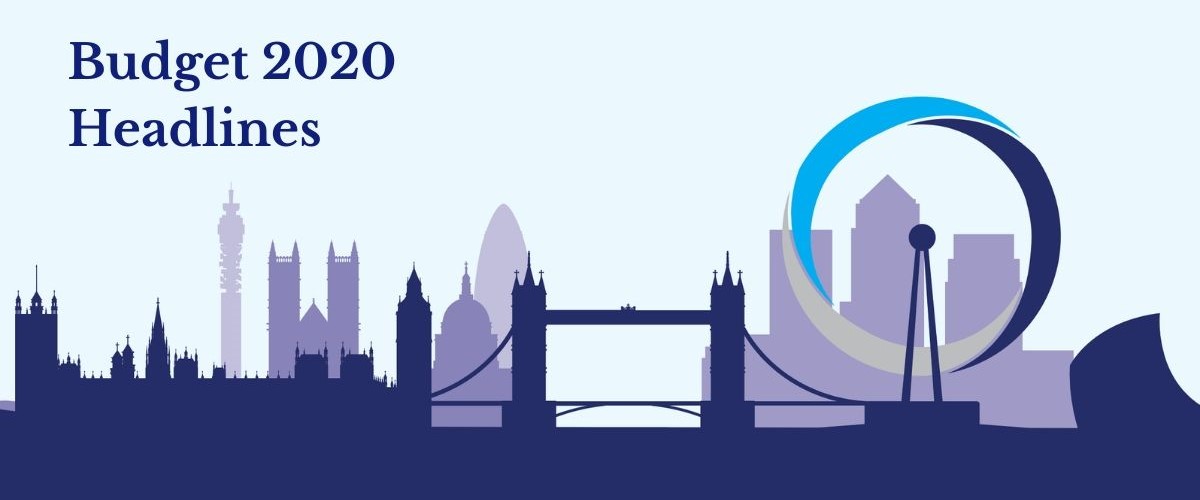Budget 2020 Headlines

It might have been 499 days since the last Budget. But, delayed by Brexit negotiations Chancellor Rishi Sunak delivered his first budget speech on 11 March 2020. The Chancellor promised throughout his speech that this was a ‘Budget of a government that gets things done’.
There was much to live up to following the government’s promises in its manifesto and with the additional requirement to address the Coronavirus – COVID19 concerns. Our summary focuses on the main points that will affect you, your family and your business.
If you are affected by changes in the Budget, whether good or bad, or would like reassurance on how your finances and plans for the future may alter, please do get in touch.
Coronavirus (COVID-19)

In response to COVID-19, the chancellor announced a £12 billion plan to support public services, individuals and businesses in the UK whose finances may be affected by the virus.
The government’s plan includes a £5 billion emergency response fund to support the NHS and other public services during and after the outbreak, in addition to a “fiscal loosening” of £18 billion.
Statutory Sick Pay (SSP) will be paid from the first day of sickness, rather than the fourth day, for people who have COVID-19 or have to self-isolate in accordance with government guidelines.
The government will temporarily by extending SSP to cover those advised to self-isolate, even if they don’t show any symptoms, including those caring for others who self-isolate.
This extends to those who are self-employed.
The government will refund Statutory Sick Pay (SSP) in full for the two-week period, to businesses with less than 250 employees. The size of the business will be determined by the number of people employed at 28 February 2020. There will be no need to produce a note from a GP for absences but a log of staff absences should be kept.
For those who don’t get sick pay eg. zero-hour contracts, access to benefits will be made quicker with claims being valid from day one instead of after a week.
In addition, a £500m hardship fund will be introduced for local authorities to help vulnerable people.
Business Tax

Corporation tax rates will remain at 19%
The Structures and Buildings Allowance will be increased from 2% to 3%
The R & D tax credit will be increased from 12% to 13%
The employment allowance will be increased from £3,000 to £4,000
Business rates will be suspended for firms in the retail, leisure and hospitality sectors In England with a rateable value below £51,000. For 2020/21 only, pubs will see the business rate discount increased from £1,000 to £5,000.
A Coronavirus Business Interruption Loan Scheme of up to £1.2m per loan will be introduced.
There will be a dedicated COVID-19 helpline for those who need more time to pay their tax liabilities. Businesses which require a deferral period on tax liabilities, may be able to agree a Time to Pay arrangement with an agreed time period to pay the tax liability to HMRC.
And finally, a £3,000 cash grant for small businesses who already get rates relief.
Personal tax

There were no major changes in relation to personal tax in this year’s budget, with the majority of rates and allowances remaining unchanged for financial year ahead.
The most noteworthy points were:
- the national insurance contributions threshold will rise by 10%, from £8,632 to £9,500
- the minimum income floor for Universal Credits will be removed
- the capital gains tax annual exempt amount for 2020–21 will rise from £12,000 to £12,300 for individuals and personal representatives, and from £6,000 to £6,150 for trustees of settlements
- the Chancellor will not fully abolish entrepreneur’s relief but instead the lifetime limit will be reduced from £10m to £1m.
Pensions

The annual allowance for pension contributions is remaining at £40,000.
However, there are changes for those effected by the pensions tapered allowance ie. earning more than the ‘threshold income’ of £110,000, or with an ‘adjusted income’ of more than £150,000. From April 2020 both the ‘threshold income’ and ‘adjusted income’ levels will increase by £90,000 to £200,000 and £240,000 respectively. Therefore, individuals with income below these new higher levels will not be affected by the tapered allowance.
For those on the very highest incomes, the minimum level to which the annual allowance can taper down will reduce from £10,000 to £4,000 from April 2020.
The maximum amount someone can accrue in a registered pension scheme will increase in line with the Consumer Prices Index for 2020/21 to £1,073,100.
Other Budget 2020 Highlights
- alcohol duty has been frozen
- fuel duty will also be frozen for another year
- red diesel tax relief is maintained for agriculture, rail and fishing with plans to abolish in most other sectors
- the Chancellor has promised to spend £500m to support the rollout of new rapid charging hubs for electric cars, which he says will ensure drivers are never more than 30 miles away from being able to charge their vehicle
- the ‘Tampon Tax’ is to be abolished, there will be no VAT on women’s sanitary products from 1 January 2021
- a stamp duty land tax surcharge will be introduced for non-UK resident of 2% from April 2021
- a Digital Services Tax of 2% is to be introduced from 1 April 2020 on the revenues of search engines, social media services and online marketplaces which derive value from UK users
- a plastic packaging tax will take effect from April 2022 and will apply to plastic packaging produced in, or imported into the UK that does not contain at least 30% recycled plastic.


